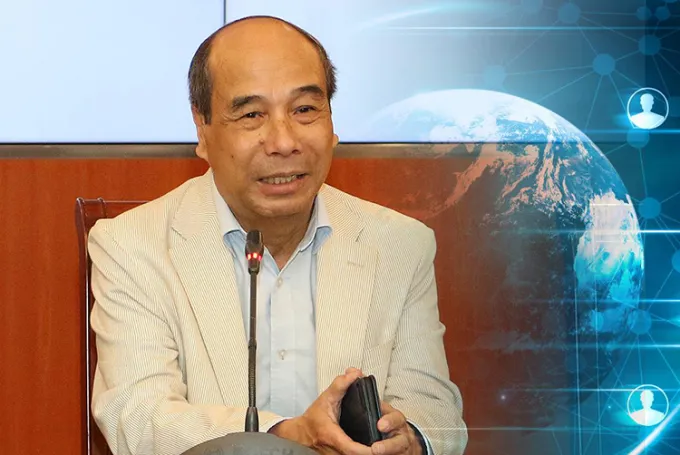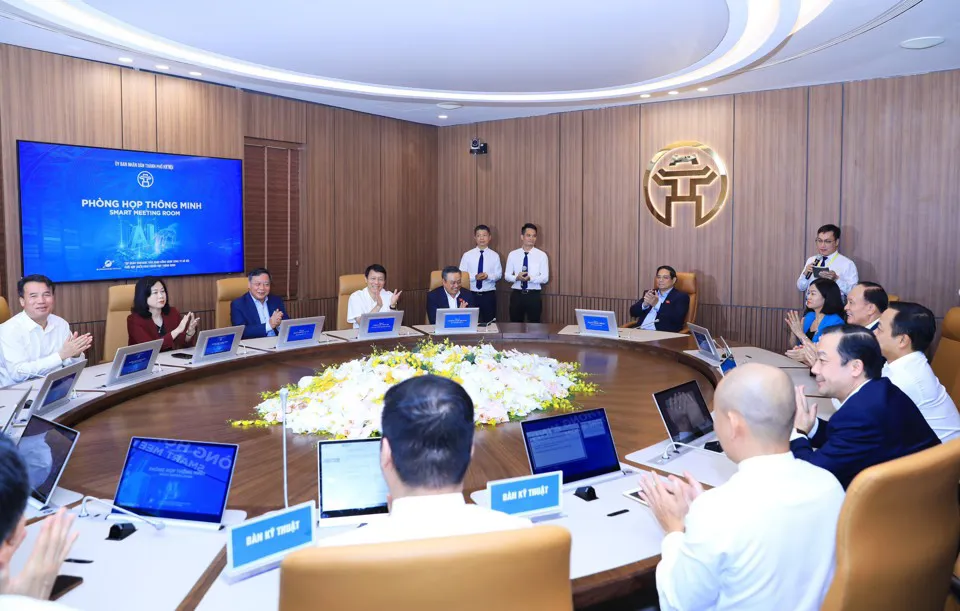Hanoi's AI development requires scholars, scientists
Professor Ho Tu Bao believes that AI tools will be the key to Hanoi's sustainable development.
Artificial Intelligence (AI) is one of the key elements driving Hanoi's future sustainable growth. Professor Ho Thu Bao, Director of the Data Science Laboratory at the Vietnam Institute for Advanced Study in Mathematics, shared his views on the topic with The Hanoi Times.
| Professor Ho Tu Bao, Director of the Data Science Laboratory at the Vietnam Institute for Advanced Study in Mathematics. |
How will AI benefit Hanoi?
AI technology facilitates the smoother and more effective performance of activities that require the intelligence and expertise of individuals. Such human functions will be increasingly assisted by AI, especially with the recent rapid growth of generative AI and the long-standing basic predictive AI.
Therefore, the ability to immediately apply AI to daily life and answer various requirements is the first benefit that citizens of the capital can enjoy if Hanoi focuses on AI applications. For example, they can ask AI for a specific answer when they encounter a problem that needs to be solved. It is important to remember that the more explicit and detailed the requests are, the more accurate the answers provided by AI will be.
Even within the operations of Hanoi's government apparatus, AI can provide significant support. Although AI cannot completely replace humans, it can always make suggestions to make work more efficient and less time-consuming.
This will also help Hanoi's administrative system operate effectively under the motto "for the people, by the people" by saving citizens and businesses the maximum amount of time and effort when using public services.
In addition, AI offers a number of unique benefits to the citizens of the capital for their daily needs. For example, Hanoi has created electronic health records for its residents and has a lot of data, so the integration of AI will be very helpful in the healthcare industry.
This would make it easier to develop appropriate treatment plans by giving hospitals a better understanding of residents' health status. It can help the city anticipate possible disease outbreaks.
With AI, Hanoi can build specialized systems to address pressing needs in transportation, education, and business. This will not only help the city make effective use of its data but also make processing more efficient and time-saving.
How should Hanoi integrate AI into its activities?
To make AI compatible with the city's activities, it cannot stand alone but must be part of what we can call Hanoi’s digital transformation ecosystem, as well as linked with the capital's data strategy.
| A ceremony to launch new AI applications in Hanoi last June. Photo: The Hanoi Times |
At its core, AI, like many other technologies, is based on data. In everyday life, we already have tools to make use of this data. For example, a smart city operations center is equipped with numerous tools to turn data into alerts and solutions. Therefore, building a strong data platform is essential if Hanoi wants to promote AI applications in its operations.
In summary, Hanoi needs to place AI within the city's overall digital ecosystem, directly linked to everyday needs, so that this technology can fully realize its potential in support of the capital's residents, businesses, and government.
Should Hanoi work with universities to develop and apply AI for the capital?
To answer this question, let's look at the case of Ho Chi Minh City. In its digital transformation programs, Ho Chi Minh City has worked closely with universities and institutes specializing in relevant fields. In its digital transformation task forces or AI advisory councils, up to one-third of the members are representatives from these universities and institutes.
At this point in time, technology in general and AI in particular are evolving very rapidly, sometimes on an hourly basis. High-quality resources from universities and institutes can help keep up with these changes more clearly and quickly. Therefore, Hanoi needs to take full advantage of this important resource in digital transformation, as well as in AI development and integration.
In fact, when it comes to AI technology in Vietnam, apart from enterprises, universities and research institutes have the most comprehensive understanding, both in research and application. Hanoi should pay attention to this.
Do you see an opportunity for Hanoi to accelerate the application of AI in the revised Capital Law?
The passage of the amended Capital Law is very timely and necessary for Hanoi's development in many fields, especially in science and technology. This is clearly demonstrated by the mechanism by which the Hanoi government awards contracts in this field.
Other countries divide scientific and technology research into three categories: development, applied, and basic. For instance, up to 60% of research is done on development, mostly by firms in the US and Japan. Research in the basic and applied sciences only makes up about 40%. This is very different in Vietnam, where basic and applied research make up roughly 90% of the total.
It should be noted that abroad, development research aimed at creating products is usually commissioned by enterprises. Therefore, with the Capital Law 2024, the Hanoi government should take the role of an enterprise and commission the research to boost its development.
However, the commissioning process should not be like in the past, where anyone could propose and implement whatever they came up with. Instead, there should be councils to identify the essential and pressing problems of the capital that the scientific and technological community can address. These councils can also represent the city by inviting universities, institutes, and businesses to participate in solving Hanoi's development challenges.
Now that the Capital Law has been passed and will be enacted soon, I believe Hanoi can move forward with this commissioning issue. This will create favorable conditions for capital development in science and technology, especially AI technology.
Thank you for your time!












